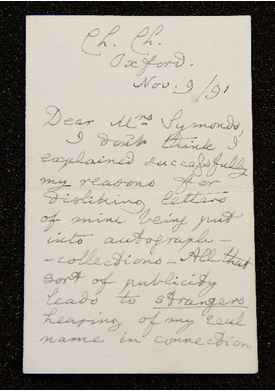Through the looking glass of fame
/ The University of Southern California recently bought a letter at a London auction, penned in 1891 by C.L. Dodgson. The only reason that anyone cares about a really old letter from C.L Dodgson is because he wrote books under a pen name - Lewis Carroll. It's a three page letter, on sepia-toned paper with perfectly old-timey slanted script. The letter seems to have the sole purpose of explaining to his friend, Mrs. Symonds, why Carroll hates being famous. He says:
The University of Southern California recently bought a letter at a London auction, penned in 1891 by C.L. Dodgson. The only reason that anyone cares about a really old letter from C.L Dodgson is because he wrote books under a pen name - Lewis Carroll. It's a three page letter, on sepia-toned paper with perfectly old-timey slanted script. The letter seems to have the sole purpose of explaining to his friend, Mrs. Symonds, why Carroll hates being famous. He says:
“All of that sort of publicity leads to strangers hearing of my real name in connection with the books, and to my being pointed out to, and stared at by, strangers, and being treated as a ‘lion.’ And I hate all of that so intensely that sometimes I almost wish I had never written any books at all."
It's fairly shocking to learn that Lewis Carroll was so appalled by fame that he had some regrets about writing Alice in Wonderland. (It's also surprising to learn that he was such a fan of underlining.) But clearly, he really didn't like that whole celebrity thing.
What did it even mean to be famous in 1891? What was it like to be a celebrity in the days before TMZ and paparazzi and Twitter fights? Were people hiding in the bushes at Thomas Edison's house? Did W.E.B. Du Bois get hounded for autographs while getting his mustache groomed at the barber shop? Could it really have been all that bad?
Yes, clearly for Carroll it could, because some people are just not cut out to be famous.
I am also one of those people. Now, let me state this clearly, before anonymous internet commenters beat me to it: I am not claiming any major type of fame here. I had a taste of that celebrity lifestyle when I acted in movies that did well at the box office. I had that mobbed-in-malls, autograph requesting, red-carpet walking lifestyle for a few years -- until I was 22 and realized, like Carroll: I hated it. I found the rejection, the lack of privacy and acting as a puppet for someone else's writing to be increasingly harsh and unsatisfying. It threatened to completely overwhelm me. Panic attacks struck and I found myself gasping for breath in dark corners, clutching my chest in an attempt to keep my heart from ricocheting off my ribs and busting through the skin.
So, I quit.
But sometimes when people find out that I used to be an actor, they often ask, with this wide-eyed expression, why I would ever leave Hollywood. I try to explain that it's just a job, with all its pros and cons, and sometimes you get tired of a job and want to try something new. Some people give me this look that apparently people have been giving for 124 years, because Carroll references it in his letter:
"Of course there are plenty of people who like being looked at as a notoriety and there are plenty who can't understand why I don't share that feeling. And they probably would not understand how it can be that human beings should have different tastes. But it is true, nevertheless."
Not everyone is cut out to be a doctor, likewise, not everyone is cut out to be famous. Yet, unlike being a doctor, most people think they would be pretty good at being famous.
But we see people who are bad at being famous all the time. Some celebrities crash their cars, go on bigoted rants and get dragged out of theaters in handcuffs. The problem comes when we fail to remember that these are people simply doing a job. If someone is a bad bartender, they get fired, but unfortunately, it appears to be quite difficult to fire a celebrity. Poor job performance just seems to get them promoted up the celebrity hierarchy.
This disastrous behavior could be blamed on money or power or access to every indulgence imaginable, but I believe it's the result of being treated - as Carroll said - as a "lion." It sounds enviable, after all, who wouldn't want special treatment? But in reality, "special" inherently means "different." And it's hard to be different.
I've recently realized that in my desperate attempt to not be a lion, I became an ostrich. By pretending that 18 years of my life never happened, I was simply sticking my head in the sand. We all have a past that stomps its feet and demands to be dealt with. My past pops up during 90's movie marathons, regardless of whether I acknowledge it or not. While the past is not deserving of a staring role in the present moment, it can be worthy of a little thank you in the credits somewhere. Because where would any of us be without it?
I hope that Lewis Carroll got to a point where he could see that the work he did meant something to people and realized that he was not required to be a lion or an ostrich or even Lewis Carroll.
All he ever needed to be was C.L Dodgson.
————– You can leave a comment here, or join us on Facebook or Twitter
